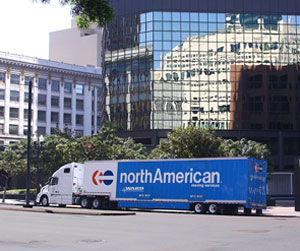![20 Tips for Moving With Kids [Infographic]](https://www.wardnorthamerican.com/wp-content/uploads/2020/09/moving-w-kids-cover.jpg)

Moving with kids infographic
1. Choose The Right Time To Move
You don’t always get a choice about when you move, but if you can, select a time that is free of other major stressors and transitions (i.e. Move in between school years, before young children start school, or after major changes such as potty training).
2. Announce The Move Early
Moving with kids is a major process. Give them plenty of time to adjust to the idea by telling them about the move well in advance. With early warning, they can have time to think about the change, process it with you and others, ask all the questions that come up, experience the range of emotions that come with moving, and better prepare for a successful transition.
3. Tell Kids What To Expect
Moving might be a somewhat nebulous idea for children, especially younger kids. Help them understand exactly what will happen by taking the time to talk about the changes that moving brings. You can even find books to read to help explain the concept in an age-appropriate manner.
4. Stay Positive
Moving brings stress. However, passing the stress of house hunting or packing will only make the process harder for your children. Try to stay positive instead. You do not have to ignore the sad or difficult parts of the move (See Point 5 below). However, when you take the time to talk about the good things that the move is going to bring for your family, you help your kids (and yourself) feel better about the change. You might even find that your children start to show some excitement about the idea of relocating.
5. Acknowledge Children’s Feelings
A wide range of emotions is normal for anyone to feel around a move. You can expect your children to feel many negative and positive emotions leading up to the big day. Make it easy for them to navigate these feelings by acknowledging them and even by sharing some of your own feelings. You can even line up a counselor to support your kids if you feel as if they need some professional guidance in sorting through their big, move-related feelings.
6. Involve Kids With The Packing
Packing with kids definitely takes longer than packing by yourself. This is particularly true if you have small children such as babies, toddlers, and preschoolers. However, allowing kids to help you with the packing can give them a sense of ownership over the move. Consider having them assist with the sorting of toys. Give them a box to pack their favorite toys in by themselves. Allow them to decorate some of the packing boxes.
7. But Also Schedule Some Kid-Free Time
Chances are you will not have an indefinite amount of time to prepare for your move. Make time to get important packing and planning done by hiring a babysitter or by sending your children to play with friends or family for a few hours periodically. The time away will help your children to de-stress, and give you the ability to focus on completing critical moving tasks.
8. Pack Special Items Separately
Any list of tips for moving with kids should include keeping their special items close. Help them to pack a separate bag full of items such as blankets, stuffed animals, favorite clothes, toys, and snacks. For kids who may not be fully potty trained, add pull ups in case you do not have easy access to a bathroom. Allow your kids to keep this bag with them throughout the move so they can stay entertained and feel comforted by familiarity during the upheaval of the move.
9. Maintain Normal Routines
Kids thrive on routine. Help them to feel more calm and positive about the move by maintaining their normal schedules as much as possible leading up to the move. For example, keep mealtimes and bedtimes the same, keep reading that story or singing that song before turning out the lights, and keep taking a few minutes out of your day to play with your child. Maintaining similar routines after you move can also create a sense of security in your children during a time of transition.
10. Leave Toys To Play With Until The End
Bored children will make your move much more stressful, for everyone. Keep your kids entertained by leaving out some toys to play with until the day you move. Even just a few favorite items can help kids feel more secure and give them something to do while you pack.
11. Get To Know The Neighborhood
Your new neighborhood will feel less strange if your children get to explore it ahead of time. If close enough, drive there with your children and look around. You can even introduce yourselves to your soon-to-be-neighbors. If you are moving long-distance, do some research and show your children books and information about the location. You can even make plans to see landmarks and attractions once you arrive.
12. Introduce Their School
The new neighborhood won’t be the only new place your children will need to adjust to. Older children will also be growing accustomed to a new school. Make the transition easier by contacting the school ahead of time to get a tour and see if the school can provide a “buddy” to show your children around on the first day.
13. Make (And Complete) A Moving Bucket List
Helping a child cope with moving includes helping them say goodbye to your current location. Try creating a list of things to do before you leave. Maybe they want to go to the children’s museum once more, walk a favorite trail, or spend time with their best friends. Make time to complete these activities, and cross them off your list. Once the list is complete, it will be time to go.
14. Create A Memento Of Your Old Location
It is natural for your children to miss your old home and the people and activities they enjoyed there. You can smooth the transition by creating a memento of the location. For example, have their classmates sign a photo of the class, or have your neighbors sign a T-shirt. Create a photo book or scrapbook of your time in your current location. This memento will be a special way to remember the old place when your children feel homesick.
15. Make Time To Say Goodbye
Saying goodbye might be an emotional time for your child, but it can also give them closure. Take the time to say goodbye to family, friends, and classmates. Hold a going away party. Make sure everyone important has your contact information, so your children can stay in touch after you relocate.
16. Give Your Children Something Fun To Do On Moving Day
Watching all of their beloved possessions leave the house on moving day will be difficult for kids. You also do not want them to be in the way of heavy items and busy movers. Plan a fun activity for them to do on moving day. Send them for a day at a friend’s or family member’s home, for example. By the time they return, everything will be loaded and ready to go.
17. Give Children Ownership Of Their New Home
Your new place might feel strange to your kids at first. Help them to begin thinking of it as home before you even arrive by allowing them to participate in decorating and unpacking the space. Allow them to pick out a color for their room, for example, or invite them to unpack their box of favorite toys. When they can arrange their space the way they want, they will feel comfortable more quickly.
18. Create A Familiar Environment
The new house does not have to feel entirely strange. Create a familiar environment in the new house to help your kids feel more comfortable right away. For example, set up one room right away so family members can relax there. Unpack their toys right away. Provide gifts for them to open when they arrive. These little touches will provide small ways for your children to feel comfortable and at home right away.
19. Find Activities For Your Kids
As you prepare for your move, and then get settled in afterward, look for activities that your kids can participate in in your new location. If your child likes to dance, look up a local dance studio. If your child enjoys sports, find a local youth sports league. Getting them settled in fun and familiar activities will allow them to acclimate more quickly to their new area.
20. Hire Movers
The less you have to worry about when it comes to the move, the less stressed you and your kids will be. Remove stress and problems by hiring a mover like Ward North American. Experienced, professional-strength movers can prevent accidents and even help you with packing, creating a more seamless transition for your whole family.





